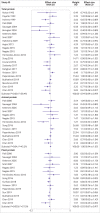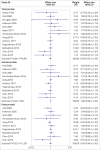Dietary intake of total, animal, and plant proteins and risk of all cause, cardiovascular, and cancer mortality: systematic review and dose-response meta-analysis of prospective cohort studies - PubMed (original) (raw)
Meta-Analysis
Dietary intake of total, animal, and plant proteins and risk of all cause, cardiovascular, and cancer mortality: systematic review and dose-response meta-analysis of prospective cohort studies
Sina Naghshi et al. BMJ. 2020.
Abstract
Objective: To examine and quantify the potential dose-response relation between intake of total, animal, and plant protein and the risk of mortality from all causes, cardiovascular disease, and cancer.
Design: Systematic review and meta-analysis of prospective cohort studies.
Data sources: PubMed, Scopus, and ISI Web of Science until December 2019, and references of retrieved relevant articles.
Study selection: Prospective cohort studies that reported the risk estimates for all cause, cardiovascular, and cancer mortality in adults aged 18 or older.
Data synthesis: Random effects models were used to calculate pooled effect sizes and 95% confidence intervals for the highest versus lowest categories of protein intake and to incorporate variation between studies. Linear and non-linear dose-response analyses were done to evaluate the dose-response relations between protein intake and mortality.
Results: 32 prospective cohort studies were included in the systematic review and 31 in the meta-analysis. During the follow-up period of 3.5 to 32 years, 113 039 deaths (16 429 from cardiovascular disease and 22 303 from cancer) occurred among 715 128 participants. Intake of total protein was associated with a lower risk of all cause mortality (pooled effect size 0.94, 95% confidence interval 0.89 to 0.99, I2=58.4%, P<0.001). Intake of plant protein was significantly associated with a lower risk of all cause mortality (pooled effect size 0.92, 95% confidence interval 0.87 to 0.97, I2=57.5%, P=0.003) and cardiovascular disease mortality (pooled hazard ratio 0.88, 95% confidence interval 0.80 to 0.96, I2=63.7%, P=0.001), but not with cancer mortality. Intake of total and animal protein was not significantly associated with risk of cardiovascular disease and cancer mortality. A dose-response analysis showed a significant inverse dose-response association between intake of plant protein and all cause mortality (P=0.05 for non-linearity). An additional 3% energy from plant proteins a day was associated with a 5% lower risk of death from all causes.
Conclusions: Higher intake of total protein was associated with a lower risk of all cause mortality, and intake of plant protein was associated with a lower risk of all cause and cardiovascular disease mortality. Replacement of foods high in animal protein with plant protein sources could be associated with longevity.
© Author(s) (or their employer(s)) 2019. Re-use permitted under CC BY. No commercial re-use. See rights and permissions. Published by BMJ.
Conflict of interest statement
Competing interests: All authors have completed the ICMJE uniform disclosure form at http://www.icmje.org/coi\_disclosure.pdf and declare: support from the Research Council of School of Nutritional Sciences and Dietetics of Tehran University of Medical Sciences, Tehran, Iran for the submitted work; no financial relationships with any organisation that might have an interest in the submitted work in the previous three years; no other relationships or activities that could appear to have influenced the submitted work.
Figures
Fig 1
Flow diagram of study selection
Fig 2
Forest plot for association between protein intake and risk of all cause mortality in adults aged 19 or older, expressed as comparison between highest and lowest categories of protein intake. Diamonds represent pooled estimates from random effects analysis
Fig 3
Forest plot for association between protein intake and risk of cardiovascular disease mortality in adults aged 19 or older, expressed as comparison between highest and lowest categories of protein intake. Diamonds represent pooled estimates from random effects analysis
Fig 4
Forest plot for association between protein intake and risk of cancer mortality in adults aged 19 or older, expressed as comparison between highest and lowest categories of protein intake. Diamonds represent pooled estimates from random effects analysis
Fig 5
Non-linear dose-response association of intakes of total, animal, and plant protein (based on percentage of kcal/day (1 kcal=4.18 kJ=0.00418 MJ) with risk of mortality from all causes, cardiovascular disease (CVD), and cancer in adults aged 19 or older. Dietary intake of protein was modelled with restricted cubic splines in a multivariate random effects dose-response model. Black line indicates the linear model; solid purple line indicates the spline model; dashed lines represent 95% confidence intervals. ES=effect size
Similar articles
- Dietary protein intake and all-cause and cause-specific mortality: results from the Rotterdam Study and a meta-analysis of prospective cohort studies.
Chen Z, Glisic M, Song M, Aliahmad HA, Zhang X, Moumdjian AC, Gonzalez-Jaramillo V, van der Schaft N, Bramer WM, Ikram MA, Voortman T. Chen Z, et al. Eur J Epidemiol. 2020 May;35(5):411-429. doi: 10.1007/s10654-020-00607-6. Epub 2020 Feb 19. Eur J Epidemiol. 2020. PMID: 32076944 Free PMC article. - Association between total, animal, and plant protein intake and type 2 diabetes risk in adults: A systematic review and dose-response meta-analysis of prospective cohort studies.
Fotouhi Ardakani A, Anjom-Shoae J, Sadeghi O, Marathe CS, Feinle-Bisset C, Horowitz M. Fotouhi Ardakani A, et al. Clin Nutr. 2024 Aug;43(8):1941-1955. doi: 10.1016/j.clnu.2024.07.001. Epub 2024 Jul 10. Clin Nutr. 2024. PMID: 39032197 - Whole-Grain Intake and Mortality from All Causes, Cardiovascular Disease, and Cancer: A Systematic Review and Dose-Response Meta-Analysis of Prospective Cohort Studies.
Benisi-Kohansal S, Saneei P, Salehi-Marzijarani M, Larijani B, Esmaillzadeh A. Benisi-Kohansal S, et al. Adv Nutr. 2016 Nov 15;7(6):1052-1065. doi: 10.3945/an.115.011635. Print 2016 Nov. Adv Nutr. 2016. PMID: 28140323 Free PMC article. Review.
Cited by
- Protein Consumption and Risk of CVD Among U.S. Adults: The Multi-Ethnic Study of Atherosclerosis (MESA).
Tark JY, Li R, Yu B, Wood AC, Padhye NS, de Oliveira Otto MC. Tark JY, et al. Nutrients. 2024 Nov 2;16(21):3773. doi: 10.3390/nu16213773. Nutrients. 2024. PMID: 39519606 Free PMC article. - Navigating Nutritional Inequality in Schizophrenia: A Comprehensive Exploration of Diet, Genetics, and Holistic Management Across the Life Cycle.
Yan Y, Zhou D, Chen J. Yan Y, et al. Nutrients. 2024 Oct 31;16(21):3738. doi: 10.3390/nu16213738. Nutrients. 2024. PMID: 39519571 Free PMC article. Review. - Association between Diet-Related Greenhouse Gas Emissions and Mortality among Japanese Adults: The Japan Collaborative Cohort Study.
Watanabe D, Maruyama K, Tamakoshi A, Muraki I; JACC Study Group. Watanabe D, et al. Environ Health Perspect. 2024 Nov;132(11):117002. doi: 10.1289/EHP14935. Epub 2024 Nov 7. Environ Health Perspect. 2024. PMID: 39509283 Free PMC article. - Unveiling the Longevity Potential of Natural Phytochemicals: A Comprehensive Review of Active Ingredients in Dietary Plants and Herbs.
Wang Y, Cao X, Ma J, Liu S, Jin X, Liu B. Wang Y, et al. J Agric Food Chem. 2024 Nov 13;72(45):24908-24927. doi: 10.1021/acs.jafc.4c07756. Epub 2024 Oct 31. J Agric Food Chem. 2024. PMID: 39480905 Free PMC article. Review. - Associations between dietary nutrient intake and sleep disorders in cancer survivors base on NHANES 2005 to 2018.
Wu Q, Yang X, Wang Z, Zhou K, Yang H, Zhou L, Gou X. Wu Q, et al. Sci Rep. 2024 Oct 30;14(1):26160. doi: 10.1038/s41598-024-77874-w. Sci Rep. 2024. PMID: 39478148 Free PMC article.
References
- World Health Organization NCD mortality and morbidity. World Health Organisation, 2016.
Publication types
MeSH terms
Substances
LinkOut - more resources
Full Text Sources




